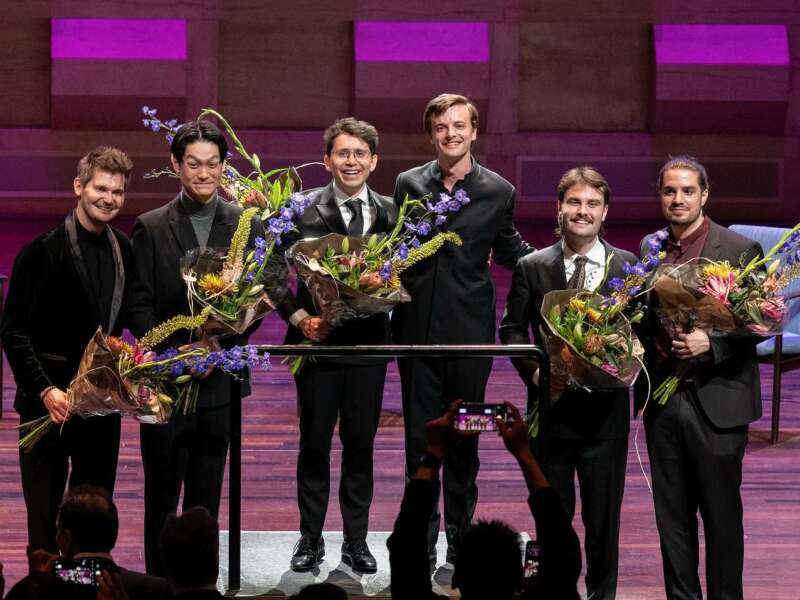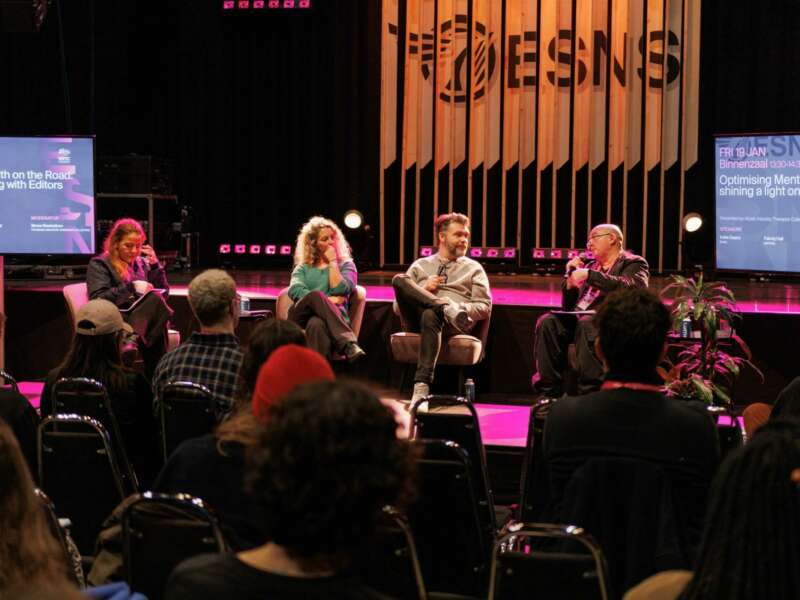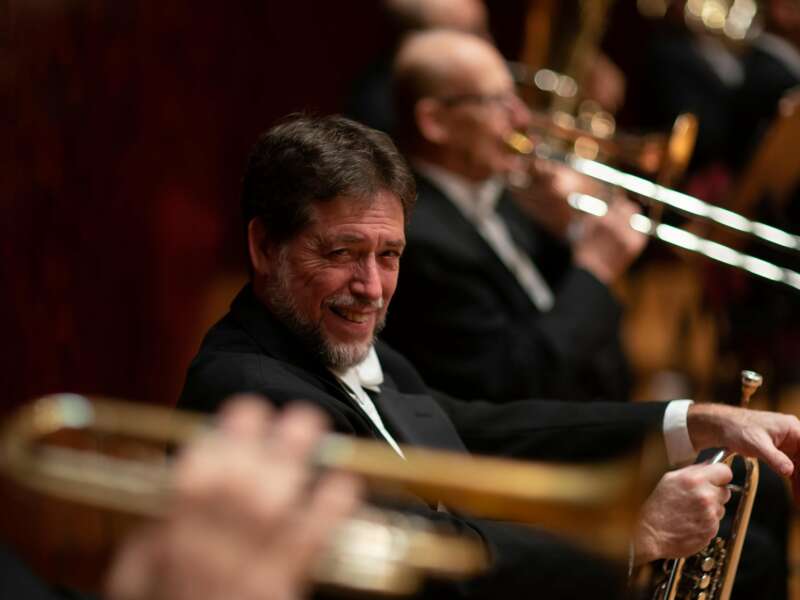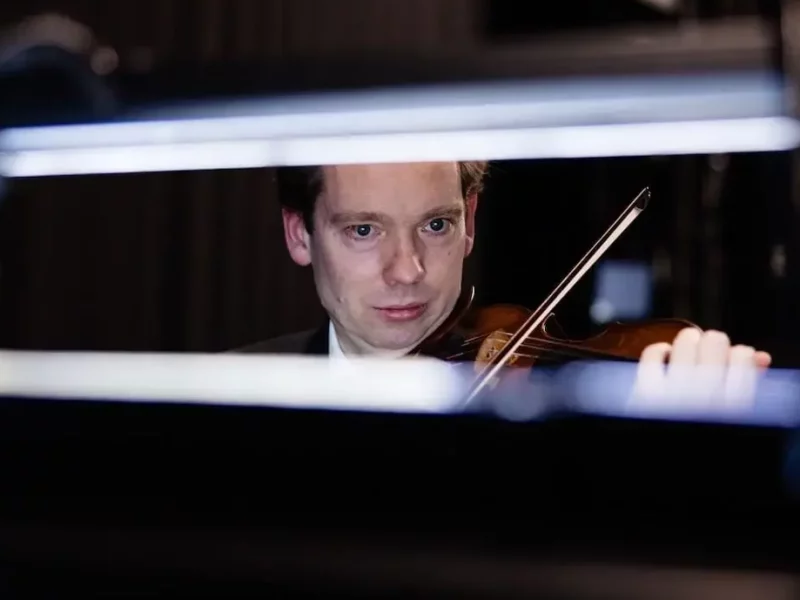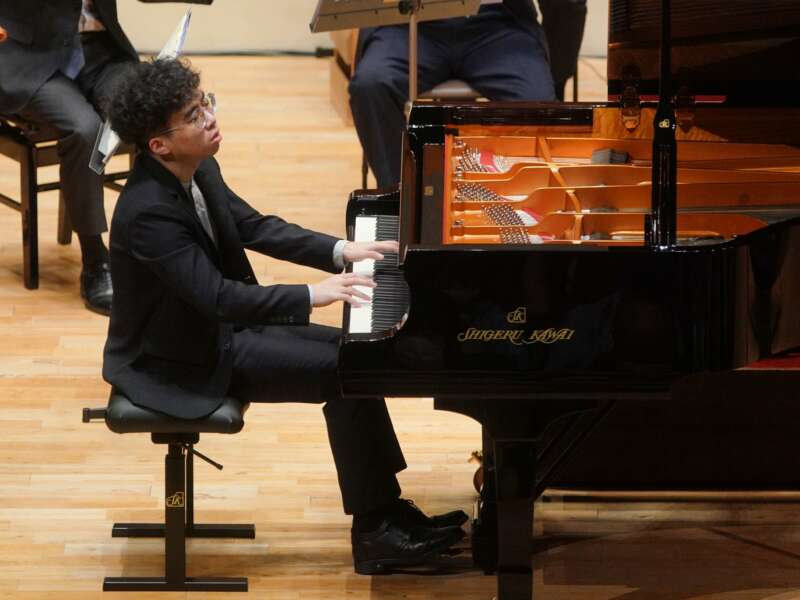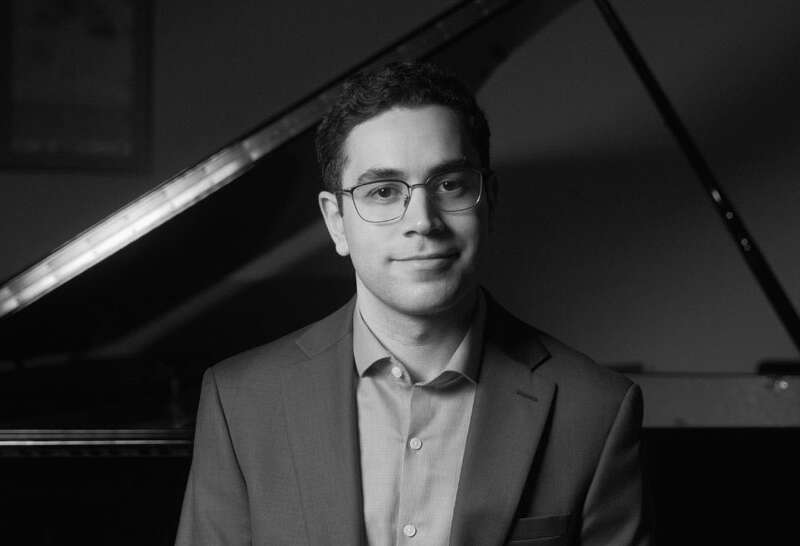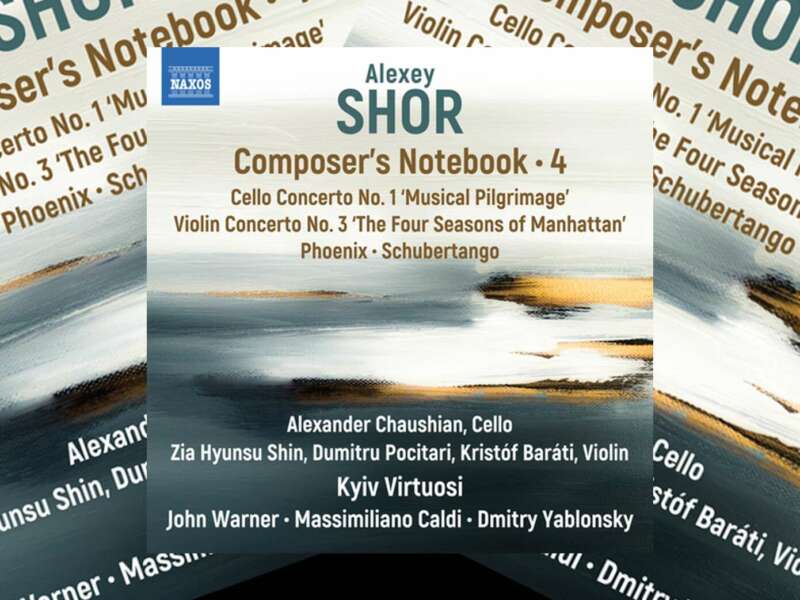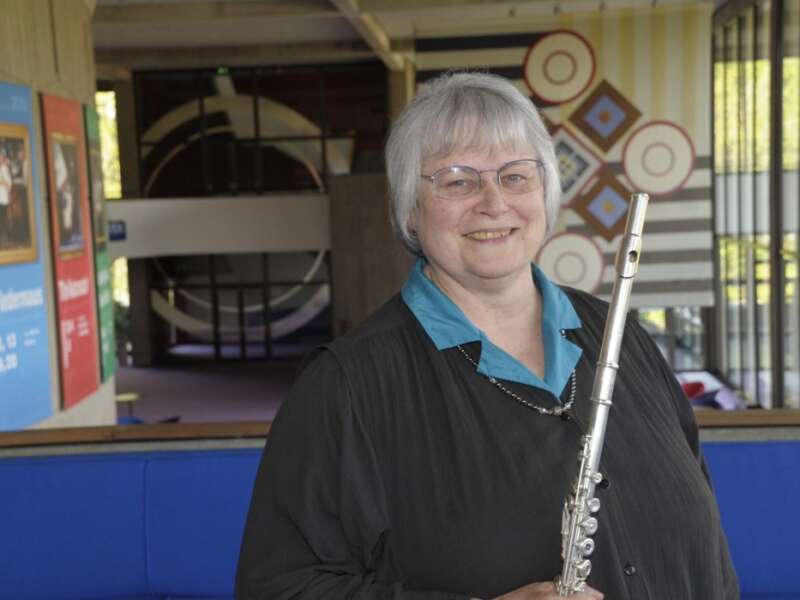Duo Contraste on the Importance of Competitions for Voice and Piano Duos
The Lyon International Chamber Music Competition, that the Duo Contraste won in 2013, is this year dedicated to voice and piano duos
The Violin Channel recently had a chance to gather tenor Cyrille Dubois and pianist Tristan Raës' thoughts on their careers and the role of competition in this particular line of work. The pair makes up Duo Contraste, who won the Lyon International Chamber Music Competition in 2013. This year's competition will take place from April 23 to 26, 2025, and will be streamed live here on The Violin Channel.
What have been some milestones since you won the Lyon International Chamber Music Competition in 2013, as a group and individually?
Since we won the competition more than 10 years ago, we have continued our collaboration as a duo without losing sight of the philosophy linked to the practice of Lied and Melody interpretation, namely: chamber music. The pianist is not an "accompanist" for a singer, we establish our partnership on a strict equal footing.
When we competed, we were young musicians coming out of the conservatory. Today we have numerous recitals in prestigious places ranging from the Bourgie Hall in Canada to the Hermitage Museum in Moscow, the Palazetto Bru Zane in Venice, and the Wigmore Hall in London or various auditoriums in Paris (Louvre, Musée des Invalides). All these opportunities came, among other things, following the competition, and we quickly became "noticed" as defenders of this very particular repertoire of the singing/piano duo. We were also able to achieve a valuable collaboration with the Aparté label with whom we now have a great list of records: Liszt O Lieb! Melodies by Nadia and Lili Boulanger, Complete Melodies by Gabriel Fauré, Melodies by Louis Beydts, and recently the Complete Melodies by Gabriel Dupont and other surprises to come...
When was your last concert as a Duo?
Last October in Wigmore Hall, we presented the first concert of a large series that we will perform in this temple of Chamber music. Dedicated to French melody the series will include 10 recitals over 5 seasons during which we will play, among other things, the complete melodies of Gabriel Fauré. We will also take up a major part of the repertoire that we have played over the last 10 years: Poulenc, Debussy, Hahn, Beydts, Dupont, Cras, Ropartz, Ravel, Bizet, Chausson, Duparc, Berlioz, and many female composers to name just a few.
Soon we will have a recital in Sceaux and in the region where I am based, in Normandy, not very far from Mont Saint Michel, supported by the small organization that I set up 3 years ago to bring music to that area: "Mélodies in Grass."
Who are the artists who inspired you in your journey through melody repertoire?
There are several. But there are not many real “melodists” out there. I would say, without raking them, Ian Bostridge, Christoph Prégardien, Roderick Williams, Felicity Lott, Elly Ameling, Sandrine Piau, François Le Roux, and Fischer-Diskau
Cyrille, does a career in opera leave the time and desire to sing the delicate repertoire of melody? How do you split your time and your voice?
Chamber music and melody, in particular, is my oxygen. However, it is so difficult to find time to play chamber music. Opportunities for demanding recitals are increasingly rare, because they are often poorly promoted, and careers based solely on this repertoire are non-existent. We must therefore "free up" time to devote ourselves to it, which is a real militant act.
Above all, I like to stay curious! I am always amazed by the amount of music that remains to be discovered or rediscovered. The help of musicologists is extremely welcomed in this area, because we performers do not necessarily have the time for this research work: I love it when I receive a message from an enthusiast who encourages me to rediscover this or that composer.
As for cultivating one's voice to interpret this repertoire, it is, above all, a richness that one cannot necessarily develop in the great operatic form. We can only go so far in chamber music in comparison to performing with an orchestra. There is a sensitivity in relation to the almost infinite colors that we can bring to the creation of this repertoire.
What musical activities have you filled your life with?
Tristan and I continue to work outside of our duo recitals. Tristan is regularly invited as a chamber music partner in other groups: sonata, trio, etc. His teaching position at the CRR in Paris leaves only a limited time to develop a concert career. But we are not exclusive and we perform voice/piano duets with other partners. This enriches our own approach to music and then nourishes the interpretation of the things we do together. For my part, I also do a lot of staged and concert opera representations. New discoveries remain an area that satisfies my appetite for rarities and curiosity about music.
If you could start over, what paths would you take? How do you look back on your journey?
It's always difficult to judge your own work. Without a doubt, Tristan and I are grateful and happy to have gotten to where we are. But it didn't happen "overnight." It is with self-sacrifice, in good and bad days, that we build a career.
We turned to the "melody" genre very early in our musical journey, by taste. We were well guided by key people who also love the repertoire and continue to amaze us with the extent of their knowledge. The time is too early for any "assessment." We are trying to continue to fulfill chamber music fans' dreams, while our dream is to have a larger sounding board for this repertoire.
Academies and masterclasses are often occasions for memorable encounters. Have you had any revelations or decisive advice from great artists throughout your training?
We were lucky at the CNSM in Paris to have good guides in the Lied and Mélodie classes given by Anne Le Bozec and Jeff Cohen, then later wonderful encounters with artists like François Leroux or Olivier Godin. These are people who, through their kindness, have awakened in us this appetite to detect the hidden treasures that punctuate the scores of this repertoire. Later on, musicologists like Alexandre Dratwicki from the Palazetto Bru Zane gave us the gift of putting rare scores into our hands.
What have you gained from your participation in competitions?
Our first duo engagements came from competitions. What was great at the end of the CIMCL competition was that we had almost 2 years of recitals scheduled ahead of us, which is a lot. This allowed us to form partnerships with people who have since continued to trust us and, above all, lay the foundations of our work.
If you were to organize a competition, what would be the format, the rewards, the repertoire, etc?
The repertoire would be in the melody genre for sure! From there, there are already some wonderful competitions, starting with the CIMCL. But also the Boulanger competition or the Toulouse Melodies competition. I would love a format in 3 rounds: eliminations, semi-final, and final, with a varied and lengthy repertoire, with a strong emphasis on rarity and curiosity. I like when I go (rarely unfortunately) to a recital and get surprised by the programmatic audacity of a colleague. There is still so much to discover.
For the rewards, I would imagine a mix of hard cash (a helping hand at the start of life for deserving young musicians) and concert engagements (because this is what gives the essential experience to put one's foot down and become an accomplished artist.)
Why do you think competitions remain so crucial in the trajectory of today's musicians?
It provides the visibility that young people are looking for. It helps them get noticed, sometimes to "challenge" themselves, to leave their comfort zone, and to be confronted with the real competition of today's fierce market. Today, there is less and less work yet more and more excellent young artists. Competitions are a stepping stone for launching a career, and without them, it is more difficult. Not impossible though, let's remain optimistic!
What would you like to say to the candidates for the 2025 Lyon competition?
First of all, GOOD LUCK! Believe in what you do! Be bold so as not to regret anything. This moment is short, make the most out of it, whatever the results.
What would be your winning recipe?
Three things: Work, then, work and.... did I already say work?
More seriously, talent is a necessary but not the only element. Artists with superior means will be judged all the more harshly if we feel that they are relying too heavily on their raw talent.
Also, be curious. Surprising the jury — in the right way — can open doors.
And in the end, have fun! If the work has been put in beforehand, we are given the assurance and serenity of letting go in the moment of the concert. It allows us to bring out the best in ourselves and when that happens, there will be nothing to regret.
To those who win: the hardest part is starting, you're only at the beginning of your journey!
In 2025, the Lyon International Chamber Music Competition's jury will comprise mezzo-soprano Bernarda Fink, soprano Véronique Gens, pianist Markus Hadulla, tenor Mark Padmore, baritone Dietrich Henschel, and pianist Susan Manoff.
Open to candidates under the age of 34, the Lyon International Chamber Music Competition (CIMCL) is offering a total of €19,000 in prize money — as well as concert engagements, a tour with La Belle Saison, training at the Académie musicale de Villecroze, and many other opportunities.
15-20 duos will be selected to take part in the pre-selection round of the competition, with each duo presenting two 30-minute recitals. Then, those duos who proceed to the final will perform a 45-minute recital. This will feature a new work commissioned especially for the competition, which adds a string quartet to the duo format.
Past laureates of the competition include the Arete Quartet, from Seoul, South Korea — who won the 19th edition in 2024. The group is made up of violinists Chaeann Jeon and Eunjoong Park, violist Yoonsun Jang, and cellist Seonghyeon Park, and they received a cash prize of €10,000.
june 2025
july 2025





